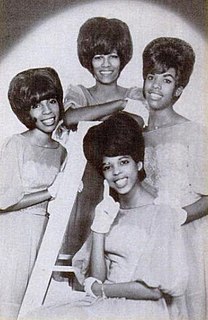Related Research Articles

"Back in My Arms Again" is a 1965 song recorded by The Supremes for the Motown label.

Dominick P. "Don" Costa was an American conductor and record producer. He discovered singer Paul Anka and worked on several hit albums by Frank Sinatra, including Sinatra and Strings and My Way.

Little Anthony and the Imperials is an American rhythm and blues/soul vocal group from New York City founded by Clarence Collins in the 1950s and named in part for its lead singer, Jerome Anthony "Little Anthony" Gourdine, who was noted for his high-pitched voice. In addition to Collins and Gourdine, the original Imperials included Ernest Wright, Glouster "Nate" Rogers, and Tracey Lord, the last two of whom were subsequently replaced by Sammy Strain. The group was one of the very few doo-wop groups to enjoy sustained success on the R&B and pop charts throughout the 1960s. They were inducted into the Rock and Roll Hall of Fame on April 4, 2009, 23 years after the group's first year of eligibility for induction.

"Tears on My Pillow" is a doo-wop song written by Sylvester Bradford and Al Lewis in 1958. The composition was first recorded by Little Anthony and the Imperials on End Records and was that group's debut recording under that name. Their original recording of the song became a Billboard top-10 hit, peaking at No. 4, No. 3 in Canada, and was the Imperials' first million-seller. It was also a two-sided hit, with its flip side, "Two People in the World," also becoming a major hit. Although it remains one of the Imperials' signature songs, "Tears on My Pillow" has been extensively covered, including a No. 1 in the UK Singles Chart version by Kylie Minogue in January 1990.

The Temptin' Temptations is the third studio album by The Temptations for the Gordy (Motown) label released in 1965. The album includes several of the group's hits from 1965, and also includes a handful of singles that were not included on the Temptations' first 1965 album, The Temptations Sing Smokey. Among these are the 1964 singles "Girl " and "I'll Be in Trouble"; and the 1965 singles "Since I Lost My Baby", and "My Baby". Seven of the album's 12 tracks had previously been released as singles and their B-sides, though "My Baby" preceded the album only by a month.

DiFosco "Dee" T. Ervin Jr., usually known professionally as Big Dee Irwin, was an American singer and songwriter whose biggest hit was a version of "Swinging on a Star" in 1963, recorded as a duet with Little Eva.

Make It Happen is a 1967 album by Smokey Robinson & the Miracles. It featured ballads such as the hit singles "The Love I Saw in You Was Just a Mirage" and "More Love", as well as the up-tempo "The Tears of a Clown" co-written by Stevie Wonder and his producer Hank Cosby.

Alessandro Carmelo "Teddy" Randazzo was an American pop songwriter, singer, arranger and producer, who composed hit songs such as "Goin' Out of My Head", "It's Gonna Take a Miracle", "Pretty Blue Eyes", and "Hurt So Bad" in the 1960s.

The Royalettes were a four-girl group from Baltimore, Maryland who exemplified the "sweet soul" style of the mid-60s.

"Goin' Out of My Head" is a song written by Teddy Randazzo and Bobby Weinstein, initially recorded by Little Anthony and the Imperials in 1964. Randazzo, a childhood friend of the group, wrote the song especially for them, having also supplied the group with their previous Top 20 Hit "I'm on the Outside ". Their original version of the song was a Billboard Top 10 Pop smash, reaching No. 6 on the Billboard Hot 100, and No. 1 in the Canadian RPM-list in 1965. The song peaked at No. 8 on Cashbox magazine's R&B chart. The Little Anthony and the Imperials original recording is the best-known version of the song, although it has since been covered by many other artists, including the Zombies, who released a rendition as their last single on Decca Records.

"Hurt So Bad" is a song written by Teddy Randazzo, Bobby Weinstein, and Bobby Hart. It is a classic 1965 Top 10 hit ballad originally recorded by Little Anthony & The Imperials. Linda Ronstadt also had a Top 10 hit with her cover version in 1980. The song has been re-recorded by numerous artists including The Lettermen, who took the song to number twelve in September 1969.
"I'm on the Outside " is a 1964 hit song by Little Anthony and the Imperials, issued on DCP Records. It was a Billboard Top 20 Pop hit, peaking at number 15, and number 12 in Canada.

"It's Gonna Take a Miracle" is a popular song written by Teddy Randazzo, Bobby Weinstein, and Lou Stallman. It was first an R&B hit in 1965 for The Royalettes, who reached the Top 30 on the U.S. R&B chart and peaked at number 41 on the U.S. Billboard Hot 100 and number 37 on Cash Box.

I Know a Place is the second album release by Petula Clark, which in the USA charted at #42. In the UK, the album was released as The New Petula Clark Album, a name which was dropped during later re-releases to prevent confusion among record-buyers.

Goin' Out of My Head is an album by American jazz guitarist Wes Montgomery that was released in 1966. It reached No. 7 on the Billboard magazine R&B chart. At the 9th Grammy Awards Goin' Out of My Head won the Grammy Award for Best Jazz Instrumental Album, Individual or Group.
Robert Weinstein was an American songwriter, singer, and music industry executive, whose hit songs, mostly co-written with Teddy Randazzo, include "Goin' Out of My Head", "It's Gonna Take a Miracle" and "I'm on the Outside ".

The singles discography of Elvis Presley began in 1954 with the release of his first commercial single, "That's All Right". Following his regional success with Sun Records, Presley was signed to RCA Victor on November 20, 1955. Presley's first single with RCA, "Heartbreak Hotel", was a worldwide hit, reaching the No. 1 position in four countries and the top 10 in many other countries. Other hit singles from the 1950s include "Hound Dog", "Don't Be Cruel", "Love Me Tender", Too Much", "All Shook Up", "(Let Me Be Your) Teddy Bear", "Jailhouse Rock", "Don't", "Hard Headed Woman" and "A Big Hunk o' Love". On March 24, 1958, Presley entered the United States Army at Memphis, Tennessee, and was stationed in Germany. He left active duty on March 5, 1960.

"Better Use Your Head" is a song and single by American R&B group, Little Anthony & The Imperials written by Teddy Randazzo, who also produced it, and his wife Victoria Pike.
"Pretty Blue Eyes" is a song written by Teddy Randazzo and Bobby Weinstein. In 1959, it was a hit single for Steve Lawrence, and in 1960 for Craig Douglas.

Reddy is the eleventh studio album release by Australian-American pop singer Helen Reddy. Between 1971 and 1978, Reddy had ten studio albums released by Capitol Records, the label also having issued her Greatest Hits album and a concert album: Live in London, the latter issued in December 1978 - which same month Reddy filed suit claiming Capitol Records had shortchanged her $1,793,000, the suit being an apparent bid to win release from the label. However Reddy, issued in June 1979, would be released by Capitol Records, Reddy's tenure with the label extending to include her twelfth studio album: Take What You Find, issued in 1980.
References
- ↑ Whitburn, Joel (2004). Top R&B/Hip-Hop Singles: 1942-2004. Record Research. p. 354.
- "The Best Of Little Anthony & The Imperials" 1996 CD liner notes.